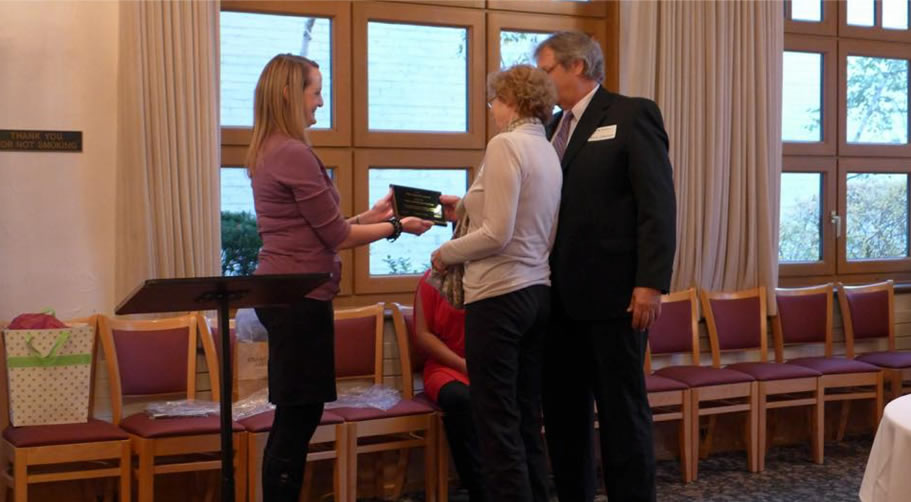June 27, 2013 | Rachel Brougham | Petoskey News
 I think about Maggie Wardle often.
I think about Maggie Wardle often.
Maggie was one of those people you knew was going to leave an impact on so many people. She was incredibly smart — I remember her in some of my high school classes — me as a senior, her as a sophomore. She fit in with every type of group — the type of person who could make friends with anyone. She had incredible talent — in addition to academics, she excelled at music, basketball and golf.
The type of person you feel lucky to know, whether you called her a friend or not.
Maggie died in a murder-suicide in October 1999, a victim of domestic violence. She was a sophomore at Kalamazoo College.
It was homecoming weekend and according to other students, Neenef Odah, a fellow K College student who Maggie had dated on and off, grew jealous following a dance where he saw Maggie with another man.
It was just after midnight when reports came in about shots fired in Odah’s dorm room. When police arrived, they found Odah had shot Maggie twice before killing himself.
In the aftermath, family and friends of Maggie said there had been warning signs of problems between the couple, including Odah’s jealousy, attempts to isolate her from friends and his efforts to control her emotions.
I think about Maggie Wardle often.
We grew up in Plainwell, a town a bit smaller than Petoskey, just north of Kalamazoo. The type of town that back when we were younger, everyone knew each other. A place where parents would allow their children to ride their bikes down to the local ice cream shop on their own. Neighbors helped neighbors. The big news always seemed to focus on one of the school’s athletic teams having a winning season.
Back then at least. Plainwell, like so many other small communities, has changed a lot. It’s no longer a sleepy town. You don’t know all your neighbors anymore. Scarier things are happening.
A couple years ago, we had a murder-suicide involving a Plainwell police officer and his wife.
Last year, a man killed his live-in girlfriend.
And just last week, a 24-year-old killed his 23-year-old girlfriend before killing himself. The woman was a daughter of a Plainwell Public Safety officer.
Each of these tragedies made me think of Maggie. Every time I hear about any domestic violence case, I think about her — amazing person she was, what was ahead for her, the person she was going to be. We all knew Maggie was going to great things, but this wasn’t supposed to be her legacy. Her story has been told and retold, but it’s not the type of impact we thought she would make.
The same could be said for any of these women.
Recent statistics on domestic violence cases in the U.S. are alarming.
- One in four women has experienced domestic violence in her lifetime.
- Estimates range from 960,000 incidents of violence against a current or former spouse, boyfriend, or girlfriend to 3 million women who are physically abused by their husband or boyfriend per year.
- Nearly three out of four Americans personally know someone who is or has been a victim of domestic violence. And 30 percent of Americans say they know a woman who has been physically abused by her husband or boyfriend in the past year.
- On average, more than three women and one man are murdered by their intimate partners in this country every day. In 2000, 1,247 women were killed by an intimate partner. The same year, 440 men were killed by an intimate partner. Intimate partner homicides accounted for 30 percent of the murders of women and 5 percent of the murders of men.
- Approximately one in five female high school students reports being physically and/or sexually abused by a dating partner.
Domestic violence doesn’t just have to be physical or sexual abuse, it can also be verbal and emotional. Signs include fear of partner, having a partner that belittles you or tries to control you and feelings of self-loathing, helplessness and desperation.
Unfortunately, too many of these warning signs either go unnoticed or ignored. But they never should be.
Talk to your sons and daughters about domestic violence. About the warning signs, the dangers and that there is help out there.
Because it’s not that I don’t want to remember Maggie Wardle. It’s just that I don’t want to have to think about her so often.
If you believe you are the victim of domestic violence, or know someone who is, there is help.
The National Domestic Violence Hotline takes calls 24/7: (800) 779-7233. Their website, www.thehotline.org, is also full of resources.
Locally, the Women’s Resource Center of Northern Michigan helps victims with counseling, support groups and offers a safe house for women and children. In Petoskey, the Women’s Resource Center is located at 423 Porter Street. Call (231) 347-0067.
Rachel Brougham writes about a number of topics in this column which appears each Thursday. Email her at rbrougham@petoskeynews.com.

